" Cardiovascular diseases
(CVDs) are one of the major health concerns worldwide.
They contribute
to most of the deaths, and the numbers are still upsurging
. According to the world health organization report
2016, cardiovascular diseases are the leading reason of
morbidity and mortality globally and were responsible for
17.9 million deaths, representing 31% of all worldwide
casualties. Cardiovascular diseases are a group of
medical conditions of the heart & blood vessels, such
as coronary heart disease (CHD), heart failure, rheumatic
heart disease, hypertensive heart disease, and stroke.
Among heart diseases, stroke and ischemic heart disease
are the leading cause of death and disability (3). Furthermore,
coronary artery disease is another common heart ailment.
It also contributes to deaths and disabilities at a massive
level as well as accelerates the economic burden. It is
estimated that around 23.3 million people may die of this
disease by 2030 "

Hydrogen Therapy in Cardiovascular
and Metabolic Diseases "Hydrogen (H2) is colorless,
odorless, and the lightest of gas molecules. Studies in
the past ten years have indicated that H2 is extremely
important in regulating the homeostasis of the cardiovascular
system and metabolic activity. Delivery of H2 by various
strategies improves cardiometabolic diseases, including
atherosclerosis, vascular injury, ischemic or hypertrophic
ventricular remodeling, intermittent hypoxia- or heart
transplantation-induced heart injury, obesity and diabetes
in animal models or in clinical trials. " Source
| "The results showed that hydrogen gas can
significantly improve cardiac function and reduce
the area of cardiac
fibrosis. In vitro experiments further proved that
H2 can reduce the hypoxia-induced damage to cardiomyocytes
and alleviate angiotensin II-induced migration and
activation of cardiac fibroblasts" |
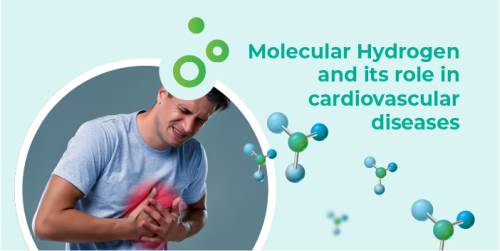
Inhalation of Hydrogen Attenuates Progression
of Chronic Heart Failure
Continuous damage from oxidative stress
is an important mechanism that facilitates Chronic
Heart Failure CHF. We summarize
that molecular hydrogen as a safe antioxidant could mitigate
progression of CHF via inhibiting apoptosis modulated by
p53. Therefore, we propose that inhalation
of H2 as a safe, convenient and inexpensive therapy may
serve as a new antioxidant
in the prevention and treatment of CHF in clinic in the
future. Source
"Multiple studies have shown that following
cardiovascular surgeries, or cardiovascular arrests,
the use of hydrogen
resulted in a better outcome for the patient. Additionally,
the brain damage which is often associated with cardiac
arrest has been shown to be diminished by using hydrogen."
" Japan Hydrogen inhalation treatment approved
by the Department of Health and Human Services,
On November 2016, hydrogen inhalation treatment device
registered as an advanced medical B
Increased number of hospitals implementing
hydrogen inhalation therapy Applied
to ambulances for emergency patients " Source |
Hydrogen/oxygen mixed gas inhalation improves disease
severity and dyspnea in patients with Coronavirus disease Molecular Hydrogen
and Heart Attacks
"Hydrogen treatment was found to significantly reduce
the area of damaged heart muscle. Scientists observed that
the left ventricular function after heart attack was improved
and the hydrogen resulted in a positive effect on the heart
remodelling. The positive effects were explained by expression
of antioxidant enzymes in the mitochondria." Source
"Molecular hydrogen uses its anti-oxidative, anti-inflammatory,
and anti-apoptotic mechanisms to relieve cardiac diseases
and improve the overall health of the patients. These action
mechanisms of hydrogen may work in synchronization to offer
cardioprotective effects and improve cardiac morphology
and function."
Clinical studies
Most of the studies related to the role of hydrogen inhalation
therapy in cardiovascular diseases are carried out in animal
models. Remarkably, the therapy showed quite promising
results in relieving disease conditions without exerting
any side effects. Additionally, the palpable research studies
offer valuable insights to design this therapy for human
clinical trials and develop a low-cost and effective treatment
method for cardiovascular diseases ".
"However, one pilot study on hydrogen gas inhalation
is available that was conducted by researchers in 2017.
The
study included twenty patients with ST-elevated myocardial
infarction (STEMI) (a severe type of heart attack) and
assigned them to either a hydrogen inhalation group (1.3%
hydrogen gas with 26% oxygen) or a placebo group (26% oxygen).
Following this, they measured the cardiac salvage index
on day 7 and onwards after primary percutaneous coronary
intervention (PCI). The results showed a significant increase
in cardiac salvage or recovery from day 7 onwards in the
hydrogen inhalation group as compared to the control group.
Moreover, the study exhibited that hydrogen gas inhalation
is a feasible and safe treatment during PCI and it may
also encourage left ventricle reverse remodeling 6 months
after ST elevated myocardial infarction (27). Besides these
effective and encouraging results in pilot-scale studies,
more similar studies and large-scale clinical trials are
required to administer hydrogen inhalation therapy for
cardiovascular diseases." Source

Hydrogen Inhalation Therapy Saves Lives and Improves Outcomes
for
Out-of-Hospital Cardiac Arrest Patients
As the study was terminated prematurely because the COVID-19
pandemic led to a drastic
increase in the demand for ventilators and a chronic staff
shortage that hampered patientenrollment, the increase in participants with good neurological
outcomes following post-OHCA
H2 inhalation in a selected population of patients was
not statistically significant.
However, the secondary outcomes suggest that H2 inhalation
may increase 90-day survival
from 61% to 85%. Further, 90-day survival with no neurological
deficits increased from 21% to 46%.
H2 has been recognized as safe for the human body, and
no side effects attributable to H2 were
observed in this clinical trial. This treatment is expected
to save the lives of many patients when
implemented in clinical settings.
The results of this study were published in eClinicalMedicine
on March 17, 2023 (JST) Source
Results and Significance of a Study
Patients with cardiogenic OHCA who regained spontaneous
circulation but remained comatose
were included in this trial. They were admitted to the
ICU and underwent standard targeted
temperature management, with one group (the H2 group) inhaling
2% hydrogenated oxygen for
18 hours while the other group (the control group) received
no H 2(See Fig. 1). Their 90-day
neurological outcomes were evaluated by two independent
neurologists. A total of 73 patients
were eligible for the study (39 in the H2 group and 34
in the control group). Unfortunately, the
study had to be terminated due to COVID-19, which caused
a strain on emergency medical care.
Therefore, it was inconclusive as to whether the H2 inhalation
therapy was effective. Nevertheless,
the fully intact survival rate after 90 days increased
from 21% in the control group to 46% in the
H2 group, and the survival rate increased from 61% to 85%.
These differences were statistically
significant, and no apparent side effects were associated
with H2 inhalation in this clinical trial. Source
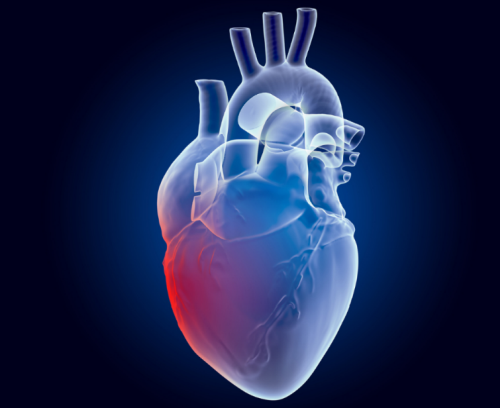
"Is hydrogen inhalation therapy safe for humans?
As hydrogen is an inert gas, it does not react with other
molecules in normal mammalian physiological conditions.
However, many research studies have also used a wide range
of hydrogen gas concentrations and found them safe. As
the use of hydrogen gas inhalation therapy is a concern
for humans, a study was carried out to determine the safe
dose of hydrogen gas in healthy individuals to determine
its clinical efficacy. They administered 2.4% hydrogen
gas in individuals and observed no significant clinical
adverse effects, suggesting it is a safe treatment for
a number of diseases, including cardiac arrest (28). Moreover,
it may help researchers and clinical experts to devise
safe hydrogen gas concentrations for curing diseases. Besides
being an effective treatment strategy, the low cost of
hydrogen gas can help reduce the economic burden of disease."
Conclusions
Hydrogen has great potential in the regulation of oxidative
stress, inflammation, energy metabolism of organelles,
and programmed cell death. Many animal experiments and
clinical trials have established the protective effects
of hydrogen on many organs and systems. Source from
Hydrogen: A Novel Option in Human Disease Treatment
Latest Hydrogen
inhalation System
plus Hydrogen Water maker combo

Japanese
type membrane 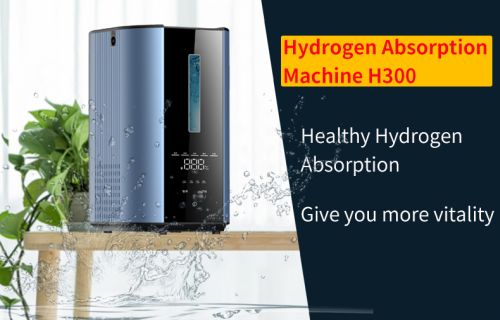
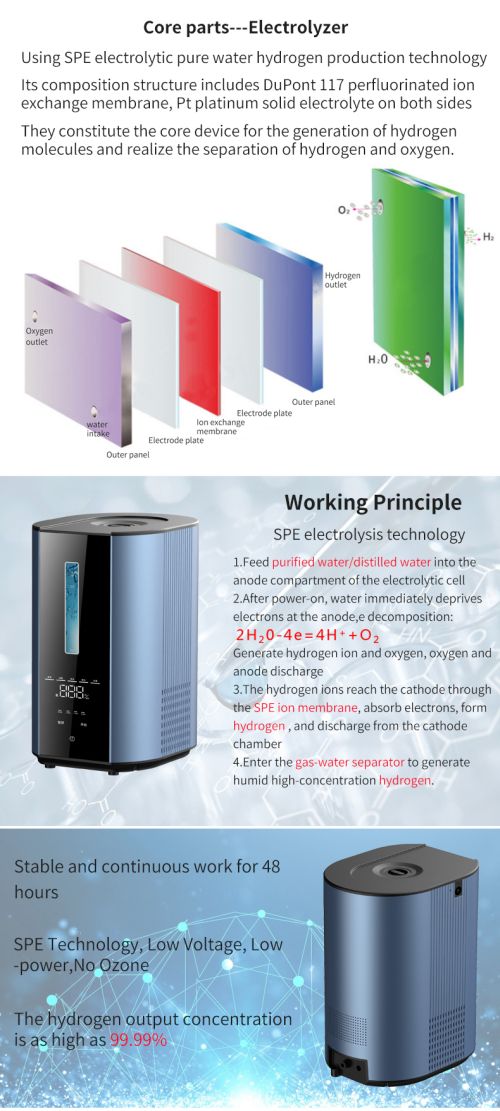
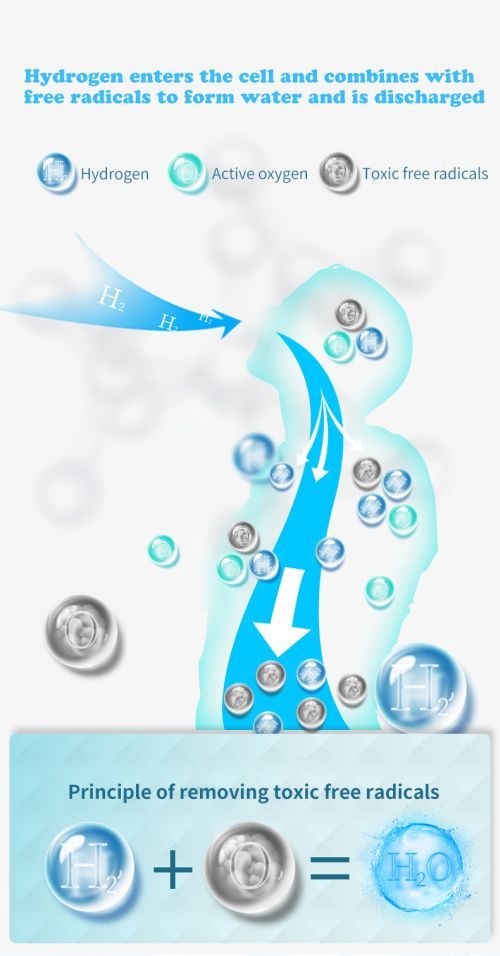
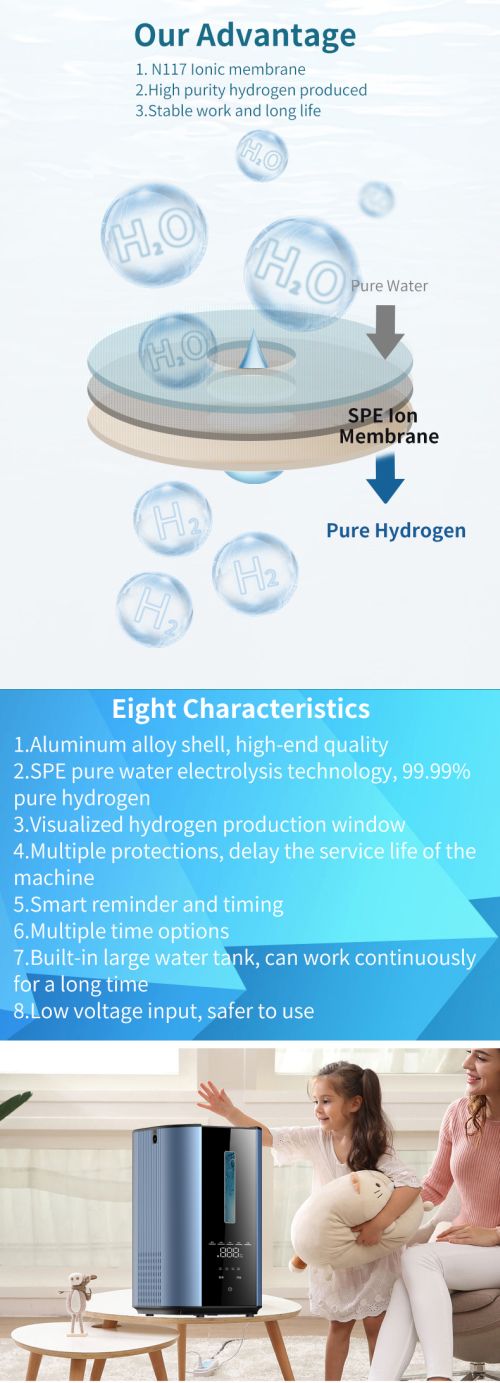
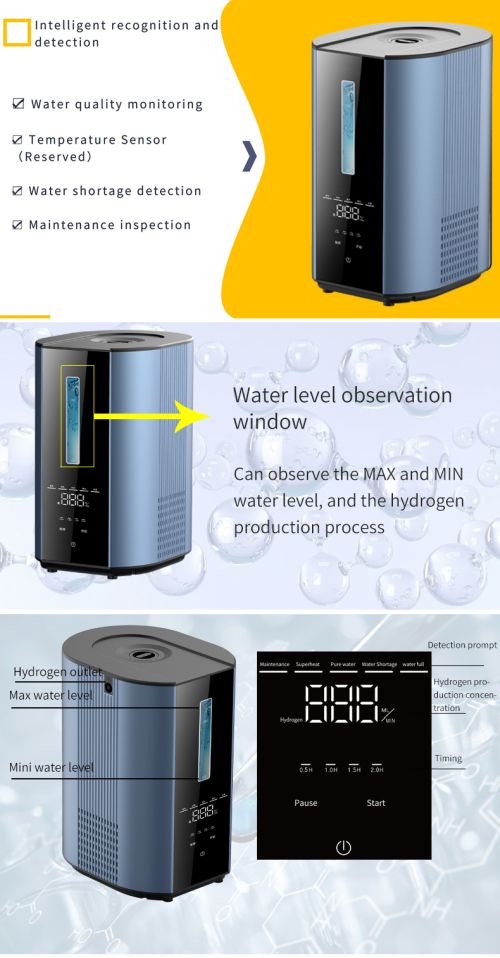
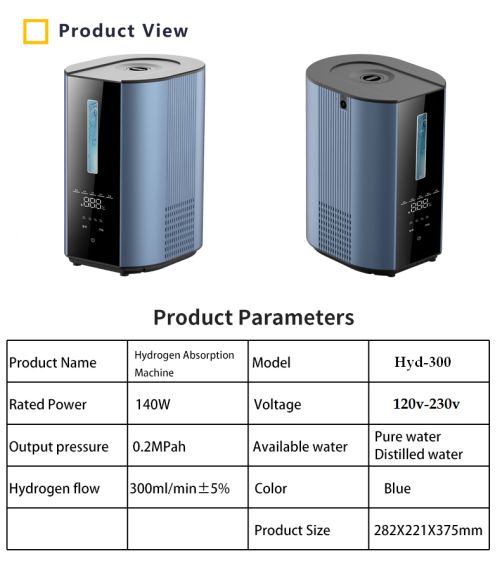

 |
Hydrogen
inhalation Pro
300ml per minute hydrogen concentration hydrogen
oxygen generator hydrogen breathing machine
|
Hydrogen inhalation
System
plus Hydrogen Water maker 2
.jpg)
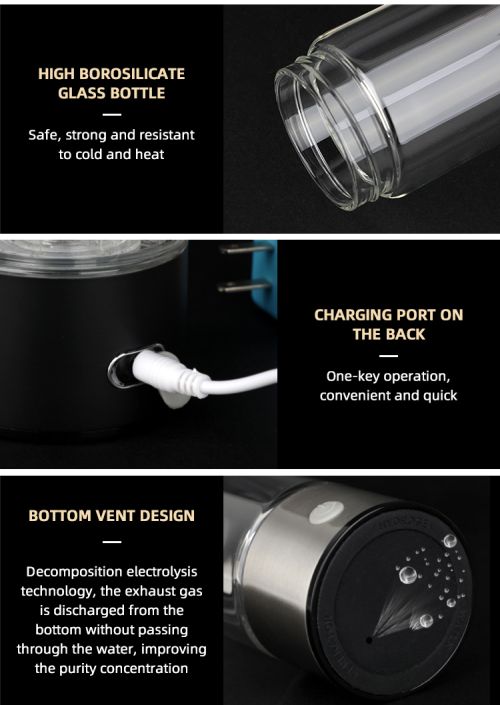
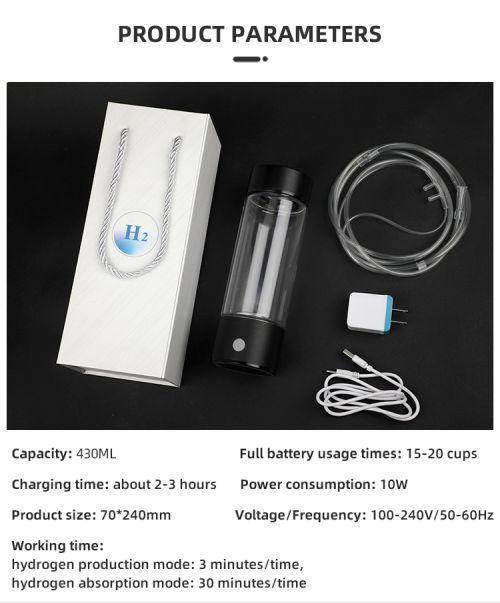
 |

Hydrogen INHALATION
plus Hydrogen Water
 Japanese
type membrane used Japanese
type membrane used
See pictures above
|
| |
|
|
Hydrogen Water Flask
Provide strong antioxidant hydrogen-rich water.
Portable - Use it anywhere, anytime to produce fresh
hydrogen-water!
 Powerful "Membrane" H
Generator Powerful "Membrane" H
Generator
 Voltage: DC 5V/1A Rechargable Voltage: DC 5V/1A Rechargable
 Power:
=5w Adapter included for your countries voltage Power:
=5w Adapter included for your countries voltage
|
| |
|
|
Bench Top Family Hydrogen water system
Specification:
 Rated
Voltage: 100-240v 50/60 HZ 1.8A Rated
Voltage: 100-240v 50/60 HZ 1.8A
 Capacity: 1- 2.5L Capacity: 1- 2.5L
 Timer 8 and 10 mintues Timer 8 and 10 mintues
 Hydrogen water producing: Basic/Strength way Hydrogen water producing: Basic/Strength way
 Dissolved Hydrogen: 0.8ppm to 1.8ppm Dissolved Hydrogen: 0.8ppm to 1.8ppm
 PH balance: 7.6 (slightly more alkaline, stabilizing
the dissolved hydrogen) PH balance: 7.6 (slightly more alkaline, stabilizing
the dissolved hydrogen)
 ORP: -500 to -550 (reducing/antioxidant) ORP: -500 to -550 (reducing/antioxidant)
 RH2 (Relative Hydrogen): 1 to 5 (reducing/antioxidant) RH2 (Relative Hydrogen): 1 to 5 (reducing/antioxidant)
|
| |
|
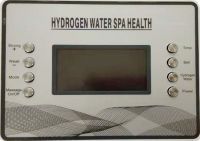 |

Hydrogen Detox foot Spa
The main effect of Negative hydrogen
spa
Detox your body through soaking your feet in Hydrogen
water:
Negative hydrogen ions has natural antioxidant biological
properties, to free the body of toxins, free radicals
and other waste into harmless water,  1x Hydrogen Detox spa 1x Hydrogen Detox spa
 1x bamboo charcoal far infrared waistbands Slimming
Belt 1x bamboo charcoal far infrared waistbands Slimming
Belt
 1x Detox Array 1x Detox Array
 1x Wrist Bands 1x Wrist Bands
 Power supply 110-240v Power supply 110-240v
More Information
|
| |
|
|
|
Multiwave
oscillators     
Rife machines and Multiwave
oscillators are claimed to complement each
other based on the principle that life forms
absorb energy. A multiwave
Oscillator uses this principle to strengthen
cells within the body to resist disease while
a Rife machine uses this principle to destroy
microorganisms with an overdose of frequency
energy.
More
information click here
|
|
|
Rife
pro optio 2h-7h     
"Royal rife developed "Five" Rife
machine prototypes ,the fith rife machine(beam ray)was
reported to be the most powerful"
""I can assure you that no one, not even
myself, could help but be astounded at the results
we are now obtaining with the assistance of our new
machines and our new band of MOR's.(Mortal oscillatory
rate)" (Letter from Dr. Johnson to Dr. Gruner
(copy sent to Dr. Rife) dated, November 4, 1936."."
"None of Dr. Rife's previous instruments ever
had the capability that this instrument had.. Dr.
Johnson pointed this fact out in his letter. "The
major difference between this new Rife Ray #5 Clinical
instrument and Dr. Rife’s previous
instruments is the fact that this new instrument
could produce over one hundred harmonic side bands
simultaneously. It was this new harmonic sideband
capability in this Beam Ray Clinical instrument which
makes this sweep we are discussing on this page possible."
The worlds most advanved
multi purpose Fully
Automatic Rife/Hoyland System Read more here
Can a Rife Machine Help?
Enter
in a problem/ see if there is a known frequency
|
|
|
Multipulser     
PEMF Pulser combo
Very powerful 6500-7000
gauss magnetic pulser
Bob beck type
blood zapper
Colloidal silver
generator
Multipulser
|
|

